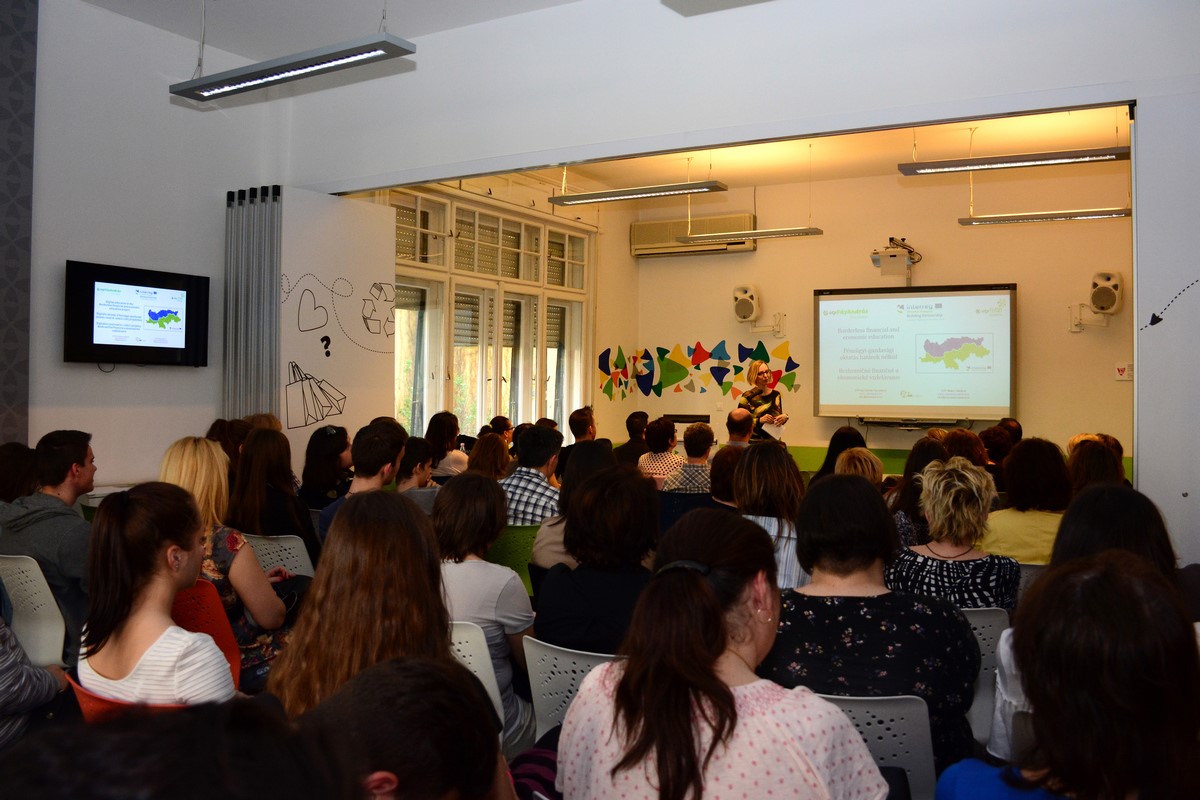






The OTP Fáy András Foundation and the OTP Ready Foundation in Slovakia’s project’s workshop-based informative event - jointly supported by the Interreg V-A Slovakia Hungary Cooperation Program – was held at in the OK Education Centres in Budapest and Nyíregyháza on April 12 of 2018, during which more than 200 students and adults had participated.
At the event, the staff of the two foundations presented to the students, teachers, educators and parents the commitments included in the program, the results achieved so far and the future prospects. The most prominent elements of the content of the program were the outline of the development possibilities of financial, economic and management education modules developed using ICT tools, robotics and coding; the curricula for adults; and the presentation of the partial results of the initiated work.
During the course of the day in Budapest and Nyíregyháza primary school students and their accompanying teachers took part in programmes, which included digital modules of robotics, practical exercises, as well as “Financial Ninja Academy” modules, through which they were the first one to familiarise themselves with the latest educational developments related to the project.
During the afternoon event, the results and the present and future realisation of educational components of the “Financial-economic education without borders” project were presented, during which the participating adults – just like the students – could try out the latest digital solutions developed for the project.
The welcome speech was provided by Larion Fejes, project-manager, for the attendees, in which he summarised the aims of the project, the achieved and anticipated results. The primary goal is for the trainings and awareness raising events to reach as many people as possible, in order to provide them with essential financial, economic and management skills, essential for the XXI. century, raising the level of financial culture of both countries.
He highlighted that within the framework of the project, the fourth OK Education Centre will open in East-Central Europe, on the 1st of June, more precisely in Nagyszombat. This centre will include three training rooms, which in the future will anticipate students, teachers and parents, from all over Slovakia, as well as from the North-West part of Hungary, who are interested in receiving financial, economic and management trainings. The project manager further added, that for those schools, which for financial reasons cannot organise for the students the travelling to the education centre, the project provides the opportunity for them to travel to the centre free of charge. Until now, more than 300 students were able to attend the OK Education Centre through this opportunity. By 31st of March, 2901 students of 68 schools from 32 cities took part in trainings, of whom 1949 were trained by the trainers of OTP Fáy András Foundation and 1407 by the trainers of OTP Ready Foundation.
Afterwards Angelika Mikóczi, manager of OTP Ready Foundation, as well as the Slovakia side of the project, talked about future plans and parts of the project. She highlighted that the opening of the new OK Education Centre in Nagyszombat, because of its geographical location, makes it possible to welcome groups from Hungary and Slovakia as well.
During the event, in relation to digital education, virtual space and robotics, Dr. Péter Galambos, head of the Biomatic Institute of Óbuda University, held a presentation, titled “Cooperation in the virtual space”.
After the brief summary regarding the developments at OK Education Centres, the participants could try out the exercises related to robotics and “Financial Ninja Academy” in three separate workshops. Afterwards Angelika Hanesz, curator of Talentum Cassoviensis Foundation, creator of the Slovakian robot-programming method, shared her practical experiences about using Lego robots during classes.
The digital solutions and developments presented at the event will be built into both training courses for students within our everyday trainings, and into the newly developed adult learning materials within the project.
The event connected in time and in its themes to the digital thematic week held between 9 and 12 of April.
In the vein of Slovakian-Hungarian gastro-culture, the organised Gastro Club provided the opportunity for the guests and project leaders to freely discuss the achieved successes and new educational opportunities.
Based on the received feedback, it can be stated that both students and adults participating in the program greatly anticipate the newest, ITC and robotics based, financial literacy improving programmes.